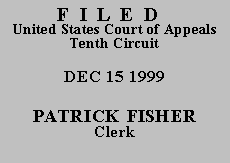

| CONNIE RAYMOND POWELL, | |
| Petitioner - Appellant, | |
| v. | |
| LARRY EMBRY and ATTORNEY GENERAL OF THE STATE OF COLORADO, | |
| Respondents - Appellees. |
This is a pro se appeal from the district court's dismissal of Petitioner Connie Raymond Powell's petition for a writ of habeas corpus filed pursuant to 28 U.S.C. § 2254. Petitioner was convicted in Colorado state court of first degree sexual assault and was sentenced to 34 years' imprisonment. On direct appeal, his conviction was reversed and he was granted a new trial for a potential due process violation. Petitioner subsequently was convicted a second time. His second conviction was affirmed on appeal and the Colorado Supreme Court denied certiorari.
In his habeas corpus petition, Petitioner alleged three claims: (1) a denial of the right to a speedy trial under Colorado statutes; (2) a violation of his Fifth Amendment protection from self-incrimination because the prosecutor used his testimony from the first trial during the second trial; and (3) the failure of the state trial court to offer a Curtis advisement concerning his right to testify.
The magistrate judge recommended that the petition be dismissed for procedural default because Petitioner had not claimed in state court that his federal constitutional rights were violated and he did not establish cause for the default nor did he establish that failure to consider his claims would result in a fundamental miscarriage of justice. See R., Doc. 18 at 3-5. After consideration of Petitioner's objections, the district court adopted the magistrate judge's recommendation for dismissal on the basis of procedural default as to all of Petitioner's claims except the Fifth Amendment claim. Noting that it was not deciding the procedural bar issue, the district court addressed the merits of this claim. The district court denied the § 2254 habeas corpus petition on the Fifth Amendment argument, explaining that "[i]t is well established that the introduction of a defendant's testimony at a former trial is admissible against him in later proceedings." Id., Doc. 27 at 5 (citing Fed. R. Evid. 801(d)(2)(A) and Harrison v. United States, 392 U.S. 219, 222 (1968)). The court also summarily rejected a belated claim of ineffective assistance of counsel. After dismissing the habeas petition with prejudice, the district court denied Petitioner a certificate of appealability and denied his motion for leave to proceed on appeal in forma pauperis.
On appeal, Petitioner renews his motion for leave to proceed on appeal in forma pauperis with this court and requests a certificate of appealability. He argues that (1) the speedy trial claim was presented to the state court as a deprivation of his federal constitutional rights; (2) the district court should have considered Petitioner's claim of actual innocence and the state court record; and, (3) based on the first two claims, the district court erred in refusing to grant a certificate of appealability.
After reviewing Petitioner's brief, the record on appeal which included a record of certain state court proceedings, the report and recommendation of the magistrate judge, and the district court's Order filed March 29, 1999, we conclude that the district court's dismissal of habeas relief was correct for the reasons stated in its order. Petitioner fails to meet either the cause and prejudice or fundamental miscarriage of justice standards, or any other exception required to overcome his state procedural default, see Anderson v. Harless, 459 U.S. 4, 6-7 (1982); Miranda v. Cooper, 962 F.2d 392, 397 (10th Cir. 1992), and his Fifth Amendment complaint is plainly without merit. For these reasons, Petitioner has not made a substantial showing of the denial of a constitutional right as required by 28 U.S.C. § 2253(c)(2). We GRANT leave to proceed on appeal in forma pauperis, and we DENY the application for a certificate of appealability.
It is ordered that the appeal is DISMISSED.
Entered for the Court
Monroe G. McKay
Circuit Judge
*. This order and judgment is not binding precedent, except under the doctrines of law of the case, res judicata, and collateral estoppel. The court generally disfavors the citation of orders and judgments; nevertheless, an order and judgment may be cited under the terms and conditions of 10th Cir. R. 36.3.